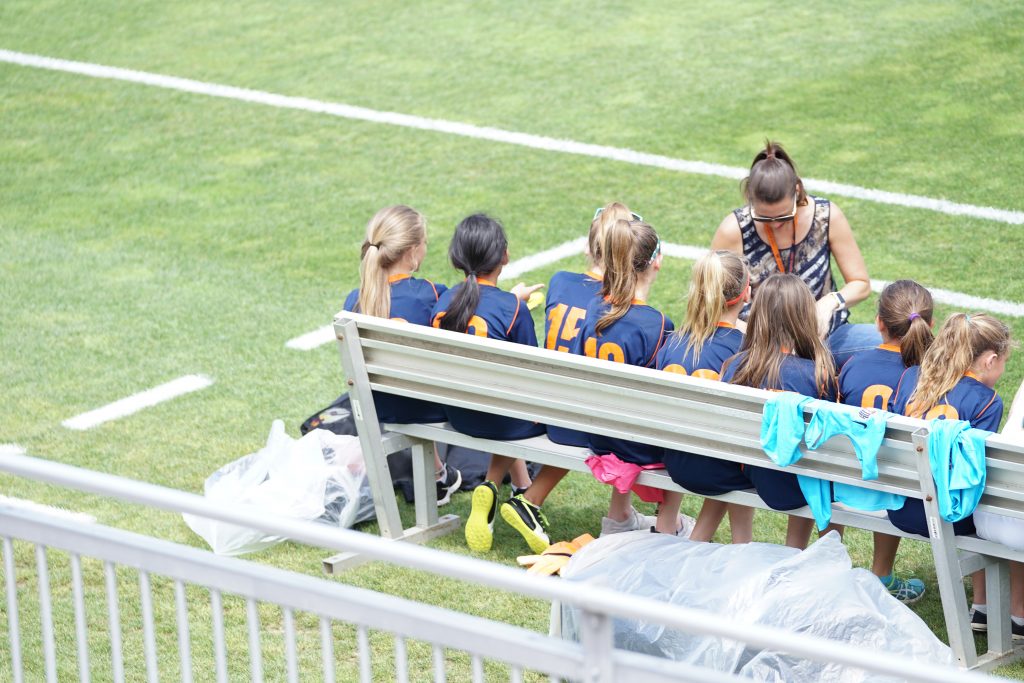"Speak the language that everybody understands. Instead of me saying he was avaricious, I would say he was bloody greedy." - Bill Shankly
I've seen many an inexperienced coach work wonders with a group simply by how they are around them. Similarly, I've seen experienced, highly qualified coach lose the focus of their players as they cannot relate. This isn't to say that one is a better coach than the other, merely the ability to communicate effectively plays a huge part in helping our players develop.
The following 4 ideas are things that I have found work well for all foundation age players, regardless of age or ability. They will help you get what you want from them. I have also found by implementing these 4 ideas that on-field communication becomes better among them.
Simplify Things

Channels. Zones. Thirds. Transition. Screen. Slide...the list of Football related terms that we take for granted is endless. Throw all of them together when giving a coaching point to an 8 year old? Good luck to you!
Foundation age players are still developing their language skills. All players are at different stages with this, regardless of what their technical skills are like. As coaches, we must appreciate this and do our best not to confuse them. When speaking to your players, the phrase "remember your audience" has never rung so true.
I have recently introduced the phrase "check your shoulders" to my U9 players. One of the players then interpreted it as "look behind you." When I asked the players the following week to remind me of that coaching point, it was no surprise that they worded it in the same way their team mate did, due to it being a far simpler way of saying what I was looking for them to do.
Word of the Week

As mentioned, there is a lot of terminology in football that young players may not necessarily be aware of. They may have heard of the words, but knowing what they mean is a different story. Case in point, I introduced the word "transition" to a group of players I work with. When I asked them what they think it means, one answered "we have transition day at school. Is it that?"
Introducing a word of the week or month, allows players the chance to develop their understanding of what the term means. It also provides you with the chance to simplify it and incorporate it into your sessions. By doing this, not only do we increase our players' knowledge of it, but also what it looks like on the field of play.
Think about the terms you want your players to learn this season and how you will bring them into your season plan.
Imagery

When I first started coaching in the US, football interest was still in it's infancy. As coaches, my colleagues and I were more popular for having a funny accent than for teaching them the sport. I even recall a colleague saying that during an MLS game, he was asked for more autographs by kids he had coached than legendary Barcelona and Bulgaria striker Hristo Stoichkov, who he was in attendance with!
Due to this, we had to find creative way to coach the players. One of these was asking the players to think that the pitch was a pizza and they were the slices of pepperoni. You wouldn't want all the pepperoni on the same slice of pizza, and it was the same when playing football. Pretty cheesy (pun fully intended) and it worked well. I read another one the other day, when talking about looking side to side as well as forward when dribbling - "what do you do when you cross the road?"
Coming up with images that the players can understand is an effective way of delivering coaching points. They are familiar to them and paint a clear picture of what you are asking for.
Leave the Post-Match debrief

Picture the scene. You've had a hard day at work, where you have put in a hell of a shift. You're about to go home for the evening when your boss calls you into his office. You then spend the next 15-20 mins where he is telling you how you could improve and where you should be doing better. How would you feel?
Now imagine how a child feels after they have just played a game and their coach wants to give them a 20 minute "debrief".
Most post-match team talks that I have witnessed go one of 2 ways. Either the team have won, the coach says well done and then the kids go home. Or the team lose and the coach talks at them for 15 minutes, giving them a bit of a rollicking during that time frame. Taking the result out of the equation, which one do you think they can appreciate more?
Chances are, after a game you are not thinking clearly. I know I rarely am. Likewise, the players have just played pretty hard for 60 minutes plus. Speaking to them for another 15 minutes isn't adding anything to help. Saving that chat for the start of the next practice is far more beneficial. Let them go home, let yourself think about things for a few days, then have a level headed chat the next time you see them.

